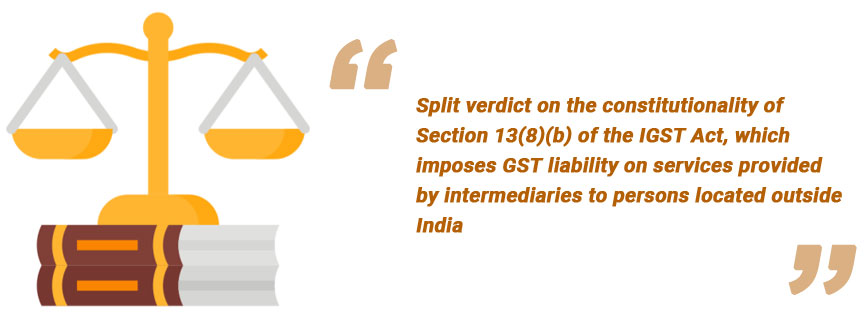- Dated 05th July, 2021

Split verdict on the constitutionality of Section 13(8)(b) of the IGST Act, which imposes GST liability on services provided by intermediaries to persons located outside India
It is a consistent stand of the Government to tax services provided by intermediaries in India. Only because the invoices are raised on the person outside India and foreign exchange is received in India, it would not qualify to be export of services, more particularly when the legislature has thought it fit to consider the place of supply as the location of the service provider in India. Thus, there is no deeming provision, but a clear stipulation in the Act legislated by the Parliament to consider the location of intermediary as the place of supply. Further, the Parliament has exclusive powers under Article 246A of the Constitution to frame laws for the inter-state supply of goods or services. In this Alert we are discussing a High Court judgement wherein it was held that Section 13(8)(b) read with Section 2(13) of the IGST Act cannot be considered as ultra-vires or unconstitutional.
Facts:-
Petitioner is a Mumbai-based proprietary concern providing marketing and promotion services to customers outside India. It solicits purchase order for its foreign customers and used to promote goods sold by its overseas customers in India.
It is contended that supply made by the petitioner is an export of services as defined in section 2(6) of the IGST Act. But because of Section 13(8)(b) of the IGST Act r/w section 8(2) Petitioner's export is being deemed as intra-state supply making him liable to CGST and MGST.
Petitioner has therefore questioned the vires of these two provisions or the competence of the Parliament to enact these provisions with reference to Articles 246A, 269A, 286 and 245 of the Constitution of India. According to Petitioner, Parliament cannot legislate to deem an export of services to be an intra-state Supply as is purportedly being done by virtue of section 13(8)(b) read with section 8(2) of the IGST Act.
As Article 246A parliament has exclusive power to make laws with respect to goods and services tax where the supply of goods, or of services, or both takes place in the course of inter-State trade or commerce.
As per Article 269A - Goods and services tax on supplies in the course of inter-State trade or commerce shall be levied and collected by the Government of India and such tax shall be apportioned between the Union and the States in the manner as may be provided by Parliament by law on the recommendations of the Goods and Services Tax Council.
Considering the above facts an writ was filed on the grounds that both Section 8 & Section 13(8)(b) of IGST are ultra-virus the constitution of India and Parliament cannot legislate to deem an export of services to be an intra-state Supply.
Petitioner Contention: -
It was contended that the Petitioner is an Intermediary rendering Intermediary Services to its overseas customers based on which the overseas customers export their goods to importers in India for which Petitioner receives commission.
Petitioner in this case stated that supply made by him is export of service as defined in Section 2(6) of IGST Act. But because of section 13(8)(b) of the Act read with 8(2) petitioner export deemed to intra-state and supply making him liable to CGST & MGST.
According to Petitioner, Parliament cannot legislate to deem an export of services to be an intra-state Supply as is purportedly being done by virtue of section 13(8)(b) read with section 8(2) of the IGST Act.

As per Section 8(2) of the IGST Act says that in case of supply of services where the location of the supplier and place of supply of services are in same state it would be treated as intra-state supply.
Provided that the intra-State supply of services shall not include supply of services to or by a Special Economic Zone developer or a Special Economic Zone unit.
Section 13 deals with the situation where the location of the supplier or recipient is outside India
The place of supply of services except the following services shall be the location of the recipient of services:
- services supplied in respect of goods which are required to be made physically available by the recipient of services to the supplier of services, or to a person acting on behalf of the supplier of services in order to provide the services
- services supplied to an individual, represented either as the recipient of services or a person acting on behalf of the recipient, which require the physical presence of the recipient or the person acting on his behalf, with the supplier for the supply of services.
Provided that where the location of the recipient of services is not available in the ordinary course of business, the place of supply shall be the location of the supplier of services.
However as per section 13(8) place of supply of following services shall be the location of the supplier of services:
- Services supplied by a banking company, or a financial institution, or a non-banking financial company, to account holders
- Intermediary services
- Services consisting of hiring of means of transport, including yachts but excluding aircrafts and vessels, up to a period of one month.
It was highlighted that both the provision in respect of place of supply and nature of supply was considered to be ultra-virus the provision of law.
Held: -
It was held by the Court that Section 13(8)(b) seeks to impose a levy of IGST on Petitioner by stipulating that in respect of Intermediary Services, where the recipient is outside the country, in those cases, the place of supply shall be the location of the supplier. It is a legitimate power of the parliament to enact IGST Act including Section 13 (8)(b).
It was mentioned that if the submission of Petitioner was to be considered, then any tax levied by the Central or State Government would be a restriction to carry on trade under Article 19(1)(g) of the Constitution of India.
Therefore, Section 13(8)(b) of the IGST Act is not unconstitutional or ultra vires Article 19(1)(g)
Section 8 deals with nature of supply whereas Section 13 deals with place of supply and the attempt to artificially link Section 8(2) with Section 13(8)(b) is misplaced and unfounded earlier. Therefore, the challenge with reference to the charging sections of Acts which operate in different fields in respect of supplies of different natures appears to be unnecessary.
Conclusion:-
By artificially creating a deeming provision in the form of section 13(8)(b) of the IGST Act, where the location of the recipient of service provided by an intermediary is outside India, the place of supply has been treated as the location of the supplier i.e., in India. This runs contrary to the scheme of the CGST Act as well as the IGST Act besides being beyond the charging sections of both the Acts.
The judge also said that the provision runs counter to the principle of GST being a destination-based tax "The extra-territorial effect given by way of Section 13(8)(b) of the IGST Act has no real connection or nexus with the taxing regime in India introduced by the GST system; rather it runs completely counter to the very fundamental principle on which GST is based i.e., it is a destination-based consumption tax as against the principle of origin based taxation "
Hence, it was considered that Section 13(8)(b) & Section 8(2) of the IGST Act are neither unconstitutional or ultra vires the IGST Act. They are constitutionally valid and operative for all purposes.
Contact Us
BT Associates
Call: 033 2534-2717 /
033 6451-8729
Mail: enquiry@btassociate.com






